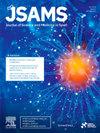补充肌酸不会增加接受雄激素剥夺疗法的前列腺癌患者的阻力训练效果:双盲随机试验
IF 3
2区 医学
Q1 SPORT SCIENCES
引用次数: 0
摘要
目的:雄激素剥夺疗法(ADT)会导致瘦体重(LM)减少、力量和身体功能下降。单独进行抗阻力锻炼可以抵消这些变化;但是,补充肌酸是否能进一步防止 ADT 引起的这些毒性反应,目前还不得而知。我们比较了在接受 ADT 的前列腺癌患者中补充肌酸并进行抗阻力锻炼与单独进行抗阻力锻炼对 LM、肌肉力量和身体功能的影响:设计:为期 12 周的随机试验:方法:接受 ADT 治疗的前列腺癌男性患者(n = 30)被随机分配到抗阻力锻炼+安慰剂(PLA)或抗阻力锻炼+肌酸(SUPP)组,两组患者均每周进行 3 天有指导的锻炼。结果包括通过双能X射线吸收测定法评估的全身和附属器官LM和脂肪量(FM),以及在基线和干预后评估的肌肉力量(胸部推举、坐姿低位、腿部推举)和身体功能(定时起立、椅子起立、400米步行):患者年龄在 59-84 岁之间,体重指数为 28.6 kg-m-2。PLA 平均完成了 30 个疗程(83%),SUPP 平均完成了 33 个疗程(92%)。尽管组内改善情况相似(P仅进行短期阻力锻炼就能显著改善 LM、肌肉力量和身体功能,肌酸补充剂不会产生额外效果。本文章由计算机程序翻译,如有差异,请以英文原文为准。
Creatine supplementation does not add to resistance training effects in prostate cancer patients under androgen deprivation therapy: A double-blind randomized trial
Objectives
Androgen deprivation therapy (ADT) leads to loss of lean mass (LM) and reduced strength and physical function. Resistance exercise alone can counteract these changes; however, it is unknown if the addition of creatine supplementation can further protect against these ADT-induced toxicities. We compared the effects of creatine supplementation with resistance exercise versus resistance exercise alone in patients with prostate cancer undergoing ADT on LM, muscle strength, and physical function.
Design
A 12-week randomized trial.
Methods
Men with prostate cancer receiving ADT (n = 30) were randomized to either resistance exercise + placebo (PLA) or resistance exercise + creatine (SUPP), with both groups undertaking supervised exercise 3 days per week. Outcomes included whole body and appendicular LM and fat mass (FM) assessed by dual-energy X-ray absorptiometry, as well as muscle strength (chest press, seated low, leg press), and physical function (timed up-and-go, chair rise, 400-m walk) assessed at baseline and following the intervention.
Results
Patients were aged 59–84 years with a BMI of 28.6 kg·m−2. PLA completed a mean of 30 sessions (83 %) and SUPP a mean of 33 sessions (92 %). Despite similar within-group improvements (p < 0.05) in whole-body LM (PLA + 0.6 kg, SUPP + 1.3 kg), appendicular LM (PLA + 0.5 kg, SUPP + 0.6 kg), muscle strength (PLA + 8.8–49.3 kg, SUPP + 9.4–40.4 kg) and physical function, there were no between group differences (p = 0.078–0.951). No adverse events were reported due to creatine supplementation or resistance exercise.
Conclusions
A short-term program of resistance exercise alone results in meaningful improvements in LM, muscle strength and physical function, with no additional effects of creatine supplementation.
求助全文
通过发布文献求助,成功后即可免费获取论文全文。
去求助
来源期刊
CiteScore
7.40
自引率
10.00%
发文量
198
审稿时长
48 days
期刊介绍:
The Journal of Science and Medicine in Sport is the official journal of Sports Medicine Australia (SMA) and is an an international refereed research publication covering all aspects of sport science and medicine.
The Journal considers for publication Original research and Review papers in the sub-disciplines relating generally to the broad sports medicine and sports science fields: sports medicine, sports injury (including injury epidemiology and injury prevention), physiotherapy, podiatry, physical activity and health, sports science, biomechanics, exercise physiology, motor control and learning, sport and exercise psychology, sports nutrition, public health (as relevant to sport and exercise), and rehabilitation and injury management. Manuscripts with an interdisciplinary perspective with specific applications to sport and exercise and its interaction with health will also be considered.

 求助内容:
求助内容: 应助结果提醒方式:
应助结果提醒方式:


